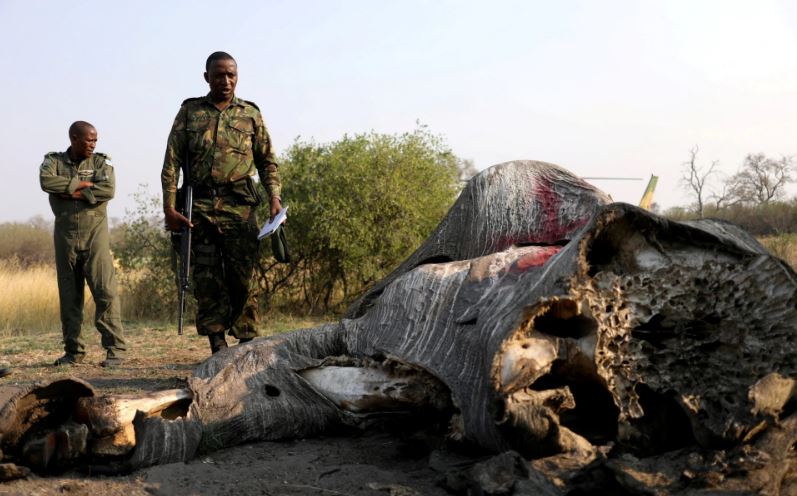Conservationists have reacted with outrage and concern to a decision by Botswana to lift its ban on elephant hunting. The southern African country said the move was justified by an increase in population and its impact on farmers’ livelihoods. Botswana has the largest elephant population in Africa, with more than 135,000 roaming freely in its unfenced parks and wide open spaces.

The former president Ian Khama, a keen environmentalist, introduced a prohibition on elephant hunting in the southern African country in 2014.
But lawmakers from the ruling Botswana Democratic party (BDP) have been lobbying to overturn the ban, saying numbers of the animals have become unmanageable in some areas.Advertisement
The current president, Mokgweetsi Masisi, took over from Khama last year and a public review began five months later, with reports suggesting growing political friction between Masisi and his predecessor.
4. BREAKING: Botswana is lifting the ban on elephant hunting.
— Yashar Ali ? (@yashar) May 22, 2019
Many believe this is an attempt by President Masisi to curry favor with rural voters ahead of the elections later this year.
Elephants are being used as a political tool. #ProtectElephants pic.twitter.com/N3YWw7HRJ5
The country’s environment ministry said in a statement that a cabinet committee review found that “the number and high levels of human-elephant conflict and the consequent impact on livelihoods was increasing.”.
“The general consensus from those consulted was that the hunting ban should be lifted,” it added, vowing that hunting would be restarted “in an orderly and ethical manner”.
Botswana has the largest elephant population in Africa, with more than 135,000 roaming freely in its unfenced parks and wide open spaces.
Some experts say the number of elephants in the country, renowned as a luxury safari destination, has almost tripled over the last 30 years, and that the population could now be more than 160,000.
Farmers struggle to keep elephants out of their fields, where they eat crops and can kill people, making the move to lift the hunting ban a potential vote winner among rural communities in the run-up to elections in October.
BREAKING Botswana lifts elephant hunting ban under guise of helping communities as Masisi destroys Ian Khama’s globally respected legacy of policies that saw elephants protected. Expect mass culling next & aggressive efforts 2 reopen ivory trade. Impact will b felt across Africa pic.twitter.com/M2oaltfHvv
— Dr. Paula Kahumbu (@paulakahumbu) May 22, 2019
Experts say the move would be counterproductive as hunting elephants makes them fearful and aggressive, exacerbating conflict with local communities.
There are also widespread concerns among environmentalists that Botswana’s decision is a precursor to a concerted effort to allow ivory to be bought and sold. This would be have a “catastrophic effect on elephants across Africa”, Kahumbu said.
Many of Botswana’s elephants roam across borders into Namibia, Zambia and Zimbabwe. All four countries have called for a global ban on the elephant ivory trade to be relaxed due to the growing number of the animals in some regions.
“We cannot continue to be spectators while others debate and take decisions about our elephants,” Masisi told a meeting of the countries’ presidents this month in Botswana.
While elephant numbers have increased in some areas, over the past decade the population of elephants across Africa has fallen by about 111,000 to 415,000, largely due to poaching for ivory, according to the International Union for Conservation of Nature (IUCN).
Zimbabwe
Zimbabwe said this month it had sold nearly 100 elephants to China and Dubai for a total price of $2.7m over six years, due to overpopulation.
According to Zimbabwe’s ministry of information, it is almost 13 years since the country’s last commercial sale of ivory. “Our ivory stockpile is worth over $300m [£235m], which we can’t sell because countries without elephants are telling those with them what to do with their animals,” Nick Mangwana, the ministry’s permanent secretary, said.
Zimbabwe will also make a separate appeal at the conference for permission to sell some of its elephants, as conflict between people and wildlife escalates.
The country has a booming elephant population, which is increasingly coming into contact with people. About 200 people have died from elephant attacks in the past five years.
Botswana last year rejected claims by a leading conservation charity that there had been a surge in elephant poaching.
The African elephant, lion and hippo appear on the International Union for Conservation of Nature’s (IUCN) “red list” of animals at risk of extinction, and needing greater protection.
Too bad they don’t care about their wildlife!












when poachers kill, the animal is wasted and no one benefits except the poacher. Poachers also will kill as many as they can get away with. wildlife management for elephants is the same as any other animal. Every country that wants to keep what ever their animal population is, will have hunting to control the population for best health of the animals. In Africa, if elephants are properly managed, the country with benefit from income from hunters from other countries. The meat is given to the locals for food, and income. That makes an incentive for local people to report and stop poaching. The hunters want the larger, older animals, which improves the health of the population in general. This should not be run by emotions, bad decisions are usually the result.
You are right… We need a regulated population to have a viable elephant population. Hopefully, everything will work out as you described it in your comment! Thanks!
Idiot!! disgusting, nothing else .
im sorryy for all the lost lives. im sorry for all of us!